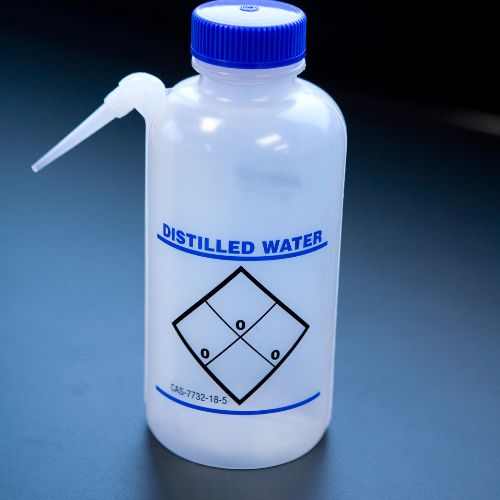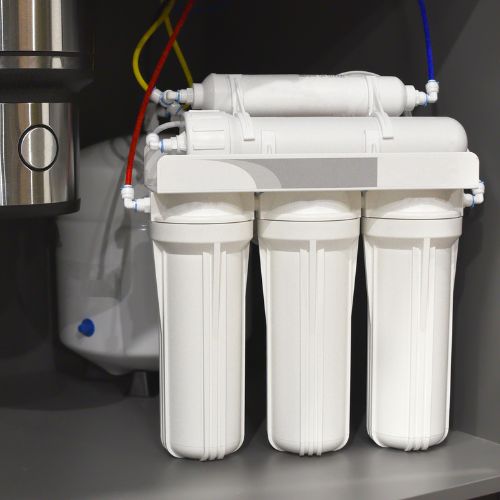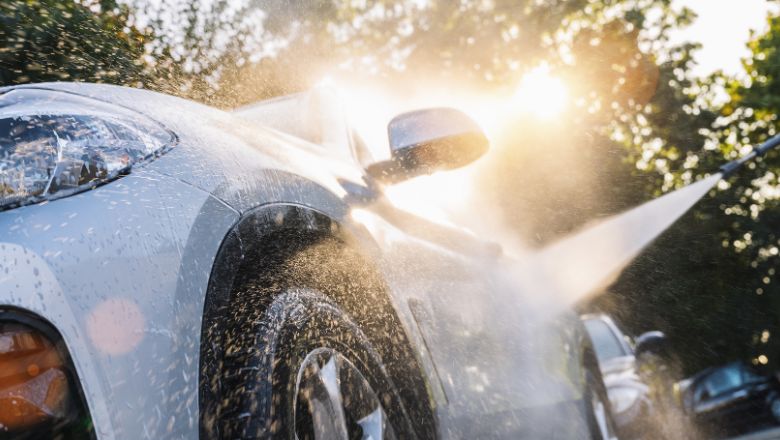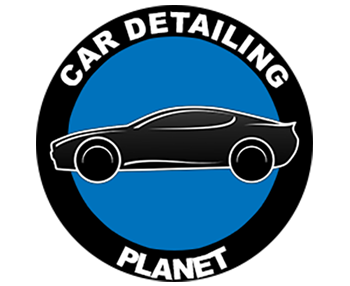In today’s article, I’ll show you what the best types of water for auto detailing are, but I also try to stay objective and realistic at the same time since not all of us have the option to get that “ideal” type of water for washing cars.
By the end of this article, you’ll know what type of water you should, can, or can’t use and how to prevent those ugly water spots and streaks after washing your car.
What Is The Best Type of Water For Car Detailing
Choosing the right type of water for car detailing can make a world of difference to the end result. And even though the average car driver won’t spot too many differences, all of us car detailers will.
In this section, we will explore three types of water that you can use for washing cars and auto detailing in general:
- Distilled water
- Deionized water
- Tap water that’s not too hard
Distilled Water

Distilled water, often recognized for its purity, is a type of water that has undergone a specific process to remove all its minerals. This process, known as distillation, involves heating the water until it turns to steam, then cooling that steam back into liquid form in a separate container. By doing this, you’re left with water that is free from minerals, impurities, and other contaminants.
The beauty of distilled water lies in its lack of minerals. When you wash your car with regular water, the minerals can dry onto the surface and leave behind visible spots. But distilled water? It’s spot-free. That’s right since it doesn’t contain any minerals to leave behind, you can say goodbye to those pesky water spots.
However, while distilled water sounds like a dream for car detailing, it does come with a few challenges. First off, it’s more expensive than your average tap water. And if you’re thinking of washing an entire car, you’ll need a lot of it. Unfortunately, distilled water is often sold in smaller containers, which means it’s not always practical for a full car wash.
That’s why some car detailers save distilled water for the final rinse. It’s a smart way to get that spot-free finish without needing to buy a small lake’s worth of distilled water. Despite its challenges, distilled water’s spot-free properties make it an attractive choice for those looking for a superior or premium car wash.
Deionized Water

Deionized water is another excellent choice for car detailing. Like distilled water, deionized water has had its minerals removed, but through a different process. Deionization involves running water through a specially designed resin that binds and removes mineral ions. The result is water that’s incredibly pure and free of minerals that can cause those unwanted spots on your car’s finish.
Now, you might be wondering why deionized water could be a better choice than distilled water for your car detailing needs. The answer comes down to accessibility and cost-effectiveness. Creating deionized water at home is much easier than distilling your water. Several systems available on the market can deionize your tap water, making it a more practical choice for regular use.
Most car detailers who avoid tap water will likely opt for deionized water. It’s not just that; it’s more accessible. It’s also a more cost-effective option than distilled water. While deionized water might not be quite as pure as distilled water, it’s still exceptionally good at preventing water spots, making it a popular choice for car detailing.
Tap Water That’s Not Too Hard

Let’s talk about tap water. It’s readily available, it’s cost-effective, and let’s be honest, it’s what most of us will use to wash our cars. And that’s okay! Tap water can do a fine job as long as it’s not excessively hard.
Hard water is water that contains high mineral content, usually calcium and magnesium. These minerals can potentially leave behind water spots on your car’s surface after a wash. The harder the water, the higher the likelihood of spotting. But not all tap water is created equal. The hardness can vary greatly depending on your location.
In my own experience, the tap water in my area is quite soft, meaning it has a low mineral content. I’ve been washing cars for years using this water and haven’t encountered any major issues with water spots. The key lies in following proper car washing guidelines.
Using tap water for car detailing is fine as long as you know its hardness. If you live in an area with soft to moderately hard water and follow a good car washing routine, you can still achieve great results without the additional cost of distilled or deionized water. It’s all about working with what you have and making the best out of it!
What Type of Water Do Car Detailers Use?

When it comes to professional car detailing, the type of water used can vary. Most car detailers, like the majority of us, use tap water. It’s readily available and cost-effective. However, if the tap water in their area is hard, meaning it has a high mineral content, they may opt for a different approach.
In areas with hard water, car detailers often use filtration or deionizing systems. This allows detailers to achieve the high-quality finish their customers expect without the expense of purchasing large amounts of distilled or deionized water.
In some parts of the world, environmental regulations also play a role in the type of water used by car detailers. Certain states mandate that car detailers must filter and recycle the water they use, similar to the process used in automatic car washes. This practice not only conserves water but also results in relatively mineral-free water for the detailing process, further preventing the occurrence of water spots.
So, in essence, car detailers adapt to their circumstances, be it the quality of their local tap water or the requirements of their local regulations, to ensure they can provide the best possible results for their clients. This flexibility and adaptability is a testament to their dedication to their craft.
Is Using Tap Water Bad For Your Car?
Is using tap water bad for your car? The short answer is, usually, no. In most cases, tap water is perfectly fine for washing your car, especially if you’re diligent about following proper car wash procedures and using the right products.
The key to preventing water spots when using tap water lies in the drying process. Using air blowers or microfiber drying towels, you can effectively remove water from your car’s surface before it can dry and leave behind mineral deposits. These tools can be invaluable in achieving a spot-free finish.
Here’s my advice for those of you in hard water areas: Consider using distilled or deionized water, but only for the final rinse. This way, you can still enjoy the cost savings of using tap water for the majority of the wash while ensuring a spot-free finish with a final rinse of purer water.
This is a practical approach that offers a balance between cost and quality.
In the end, if the water spots still occur, you can always use some of the best water spot removers to get rid of them. As long as it does not stay on the car’s paint for too long, you’ll remove it with ease.
Conclusion: The Reality
At the end of the day, the best type of water for car detailing is the one that works for you. Whether that’s tap water, distilled water, or deionized water, what matters most is that you’re able to achieve the clean, spot-free finish that you and your car deserve.
So, keep experimenting, learning, and enjoying the car detailing process. And the most important thing is that you should never change something that works wonders.
